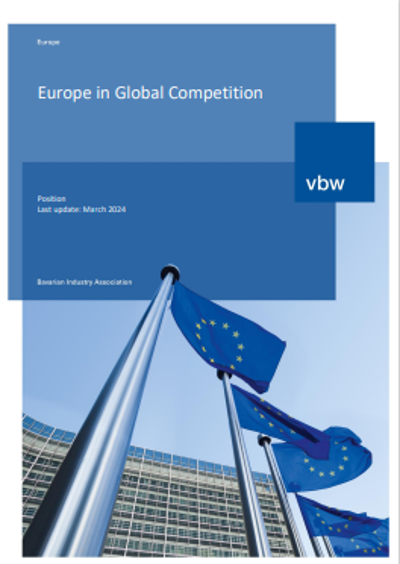Your contact

Position | 04/24
Europe in Global Competition
Europe is a strong economic area, but is gradually losing importance globally, both as a production location and as a sales market. The countries of the EU are still important industrial locations, but they are losing international competitiveness - not only compared to the dynamically growing emerging markets, but also in comparison to other industrialized countries. Integration in the European single market is of great importance for the European economies. In addition, the EU is also closely networked with other regions of the world, which secures value creation and employment in Europe.
The global economic balance of power will continue to shift. Europe will lose economic significance simply due to demographic trends. Nevertheless, the EU must embrace international competition and seize the major opportunities in markets that have so far been largely untapped. The EU must maintain proven partnerships and at the same time enter into new co-operations in order to diversify its trade relations. By the same token, it must resolutely defend global free trade. The EU can only tackle all of this with self-confidence and from a position of strength. To do so, it must intensify the unification process in a targeted manner and improve its competitiveness with a policy that favors business and innovation.
In concrete terms:
- Europe must focus on free trade and globalization: Free trade and the international division of labor lead to prosperity and employment. Europe in particular, which is losing growth potential due to demographic change, is dependent on free trade in goods and services.
- Europe must strengthen its location and competitiveness: In order to continue to benefit from globalization, Europe needs a competitive environment where value creation, investment and innovation are possible, especially in the industrial sector.
- Europe must become stronger as an economic area: Only a united and internally consolidated EU can appear strong and self-confident to the outside world. To achieve this, the internal market must be deepened and further developed.
- Europe must stand up for rules-based global trade and fair competition: The EU must work with as many partners as possible to reform the World Trade Organization (WTO) in order to restore a reliable and fair multilateral trading system. Where unfair trade practices distort competition in the EU internal market, the EU can take unilateral measures that are proportionate and WTO-compliant.
- Europe must press ahead with bilateral trade partnerships: In parallel with a reform of the WTO, the EU must also promote bilateral agreements with important economic areas in order to benefit from free trade and minimize dependencies through diversification.
- Europe must counteract the bi-polarization of the global economy: It is in Europe's interest to maintain good and stable economic relations with both the USA and China. The EU must counteract the increasing bi-polarization of the global economy and act as an independent economic area.